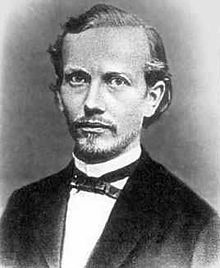Hermann Hankel
| Hermann Hankel | |
|---|---|
 |
|
| Born |
14 February 1839 Halle |
| Died | 29 August 1873 (aged 34) Schramberg, Tübingen |
| Nationality | German |
| Fields |
Mathematical analysis Special functions |
Hermann Hankel (14 February 1839 – 29 August 1873) was a German mathematician who was born in Halle, Germany and died in Schramberg (near Tübingen), Imperial Germany.
He studied and worked with, among others, Möbius, Riemann, Weierstrass and Kronecker.
His 1867 exposition on complex numbers and quaternions is particularly memorable. For example, Fischbein notes that he solved the problem of products of negative numbers by proving the following theorem: "The only multiplication in R which may be considered as an extension of the usual multiplication in R+ by respecting the law of distributivity to the left and the right is that which conforms to the rule of signs." Furthermore, Hankel draws attention to the linear algebra that Hermann Grassmann had developed in his Extension Theory in two publications. This attention was the first of many notations later made to Grassmann's early insights on the nature of space.
...
Wikipedia
